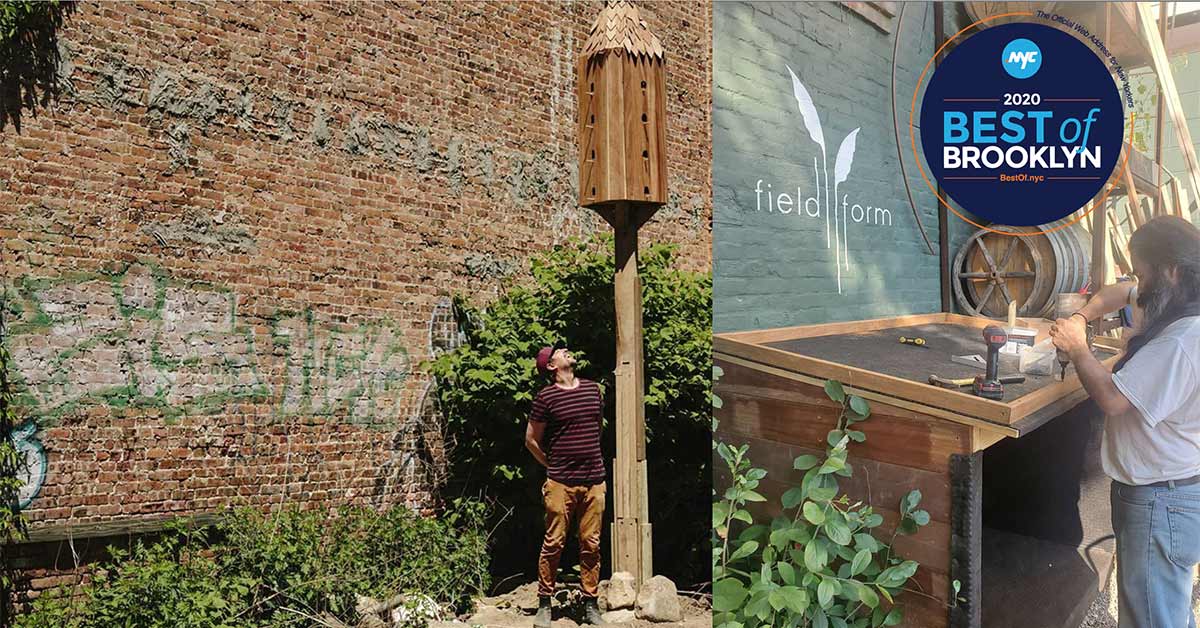
Congratulations to our 2020 Best of Brooklyn Winner
Not only did the Covid-19 pandemic encourage us to zero in on health, but our homes as well. As the entire nation sheltered-in-place, we were working where we lived and living where we worked, forcing us to not only address long-overlooked repairs and renovations, but how to make each nook of our home a meaningful and beautiful place to co-exist with our loved ones.
This extended to our outdoor spaces, no matter how little they might be. In Brooklyn, where even the smallest yard or garden is a luxury, residents were fervently seeking to upgrade these little oases.
“The relationship between people and their personal outdoor space has developed greatly during the pandemic,” says Sam Robinson, founder of Field Form, a landscape design firm based in Stuyvesant Heights. “To be able to spend time outdoors in a limited world is of high value when you cannot leave your home and the potential in these spaces is one that is now in great demand.”
From helping small restaurants create appealing outdoor dining areas, to transforming a local family’s abandoned yard into a zen garden, Robinson and his lean team of five met this wave of demand with open arms, and a green thumbs up.
“We design, build and produce landscapes in the form of gardens, architecture and culture,” says Robinson. “We are interested in the improvement of the vitality of life in our city and work out from our local workshop environment, in our neighbors gardens and public spaces.”
Here, Robinson gives us a glimpse into what it’s like running a creative Brooklyn business, and the mentality and tools that have helped him flourish in the borough and beyond.
.NYC: Can you tell us a little about yourself? What was your career before launching Field Form?
Sam Robinson: When I was 21, I signed up for federal service through the U.S. Peace Corps and spent two and a half years teaching, learning and exploring the mystery of Central Asia, a swath of unknown space between ancient empires. I lived on a former collective farm with Uygher, Russian and Kazakh people. The decline of an empire was evident in the environmental and subsequent health catastrophe which I experienced while there. Yet the people thrived through working the land, whenI returned, I decided to quit law school a few months into the financial crisis and committed myself to completely absorbing the landscape around me back in New York. I began a pursuit of horticultural studies that began with a part time job as the youngest member of a crew led by Jane Gil, the leader in NYC skyscraper gardens. After two years under her tutelage, I was accepted into an internship at the Royal Botanic Gardens in London where in the alpine plant house I maintained the collection and read monographs written by Darwin himself. When I returned I started a garden business, mostly working on maintenance as the foundational core of any landscape space.
.NYC: What motivated you to take the first step in launching your biz?
Robinson: My motivation to start a different type of landscape business really extended from a desire to have the opportunity to make more mistakes, quicker. As it appeared to me, this was the way to fully involve yourself with something
.NYC: What was one of the hardest or most unexpected obstacles you had to overcome to get your idea off the ground?
Robinson: The cost of space, always the cost of space. To get to a certain level you need at least some space, to live of course but to also hash out your idea. The overlap between life and work can be quite demanding at times when you can only afford 1 1/2 of the 2 spaces that you rent.
.NYC: Tell us about a moment you are proud of in your business journey?
Robinson: Recognizing that from the darkest times stem the greatest moments. I experienced a winter of no work and in that winter I built something out of waste which landed me a NYC community in parks project the following summer with friends of the High Line. Nothing to something, the true alchemy of New York City.
.NYC: What is special/unique about running a business in your borough of Brooklyn?
Robinson: Brooklyn is love, in fact. People in Brooklyn are great supporters of their green space and this is represented in the great block associations that exist in each neighborhood and the care and attention people pay to their sidewalks. We experience this interest everyday at our workshop, behind a bodega on Malcolm X Boulevard in Bedford Stuyvesant.
.NYC: Why did you choose the .nyc domain for your business?
Robinson: The .nyc domain represents our physical domain URL and we felt that we needed to reflect that in the digital realm.
.NYC: How have you used the .nyc domain to promote your business.
Robinson: We have used .nyc through our Instagram account and physical workshop front advertising to further associate ourselves with the city in which we live.
.NYC: Any advice you can share for someone thinking of getting their own idea off the ground?
Robinson: “Follow your true path and you will find a way.”


